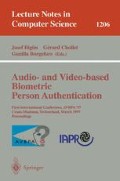Abstract
This paper introduces a novel approach to extract the speaker feature for textindependent speaker identification, the procedure to determine spectral weighting functions used in modeling the effect of the frequency selectivity and masking properties of human cochlea is systematically demonstrated. The modified LPC-derived cepstral coefficients based on spectral weighting functions are used in text-independent speaker identification to emphasize the individual information in the speech. The VQ technique is used as a classifier, experiment results obtained by the proposed approach in this paper are compared with those of LPC and PLP based method on a close set of 300 speakers, the results have shown that the proposed approach is robust against the intraspeaker and the interspeaker variations.
Preview
Unable to display preview. Download preview PDF.
References
F. Bimbot, I. Margrin-Chagnolleau, and L. Mathan, Second-order statistical measures for text-independent speaker identification. Speech Communication, 17(1–2),Aug. 1995.
S. Furui. An overview of speaker recognition techonlegy. In Workshop on automatic speaker recognition,identification and verification, pages 1–9,Apr. 1994. Martigny, SWITZERLAND.
H. Gish and G. Yu, Robust method for speaker identification in a co-channel environment, Proc. Speech Research Symposium, Baltimore, June 1993.
H. Hermansky, N. Morgan, A. Bayya, and P. Kohn. Rasta-plp speech analysis technique. In International Conference on Acoustics, Speech and Signal Processing,I-121–124,1992.
H. Hermansky, Perceptual linear predictive(PLP) analysis of speech, J.Acoust Soc, Am 87(4), pages1738–1752. 1990.
Hsiao-Chuan Wang, Ming-Shih Chen and Tracy Yang, A novel approach to the speaker identification over telephone networks, ICAASP-93, pages 407–410.
Khaled T. Assalon and Richard J. Mammone, Robust cepstral features for speaker identification, ICAASP-94, pages 129–132.
I. Magrin-Chagnolleau, J. Wilke and F.Bimbot, A further investigation on AR-vector models for text-independent speaker identification, ICASSP-96 Atlanta.
J.P. Openshaw, Z.P. Sun and J.S. Mason, A comparison of composite features under degraded speech in speaker recognition, ICAASP-93, pages 371–374.
Yu-Huang Kao, John S. Baras, P. K. Rajasekarn, Robustness study of free-text speaker identification and verification, ICAASP-93, pages 379–382.
Author information
Authors and Affiliations
Editor information
Rights and permissions
Copyright information
© 1997 Springer-Verlag Berlin Heidelberg
About this paper
Cite this paper
Jiyong, M., Wen, G. (1997). Text-independent speaker identification based on spectral weighting functions. In: Bigün, J., Chollet, G., Borgefors, G. (eds) Audio- and Video-based Biometric Person Authentication. AVBPA 1997. Lecture Notes in Computer Science, vol 1206. Springer, Berlin, Heidelberg. https://doi.org/10.1007/BFb0016004
Download citation
DOI: https://doi.org/10.1007/BFb0016004
Published:
Publisher Name: Springer, Berlin, Heidelberg
Print ISBN: 978-3-540-62660-2
Online ISBN: 978-3-540-68425-1
eBook Packages: Springer Book Archive

